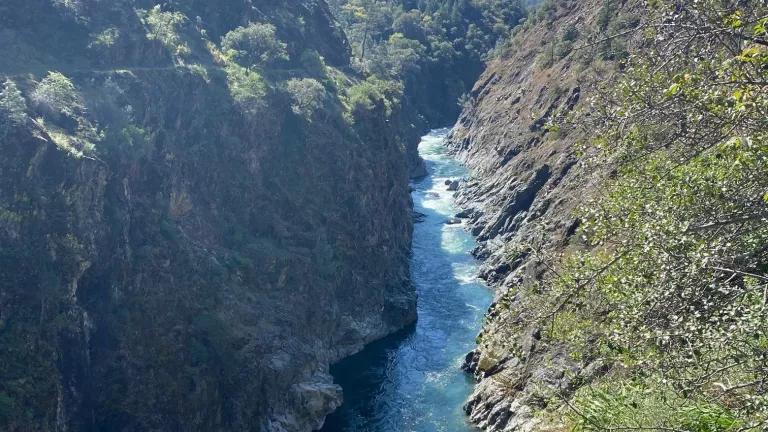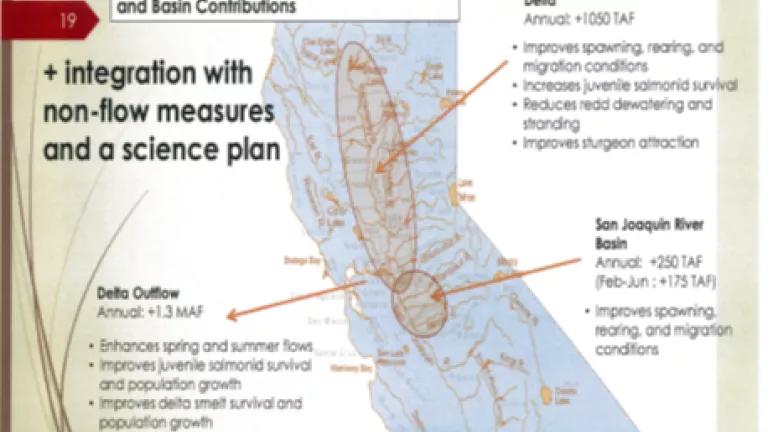Judge Halts Effort to Enlarge Shasta Dam in CA: #NoDamRaise
A judge ordered Westlands Water District to halt its planning efforts to join the Bureau of Reclamation in expanding Shasta Dam in California.

A view down the spillway of Shasta Dam to the Sacramento River below
Barry Hanks/Dreamstime
A judge ordered Westlands Water District to halt its planning efforts to join the Bureau of Reclamation in expanding Shasta Dam in California. Enlarging Shasta Dam would:
- Degrade the lower reaches of the wild and free-flowing McCloud River
- Harm the river’s world-renowned wild trout fishery
- Destroy ancestral tribal lands and sacred sites
The judge’s preliminary injunction order puts Westlands and Reclamation’s plans on ice.
The Bureau of Reclamation proposes to raise the height of Shasta Dam by 18.5 feet, but Federal law prohibits it from doing so without a local partner willing to shoulder at least 50% of the cost. Westlands Water District wants to become that partner, in hopes that raising Shasta Dam will provide it and its corporate agricultural customers with additional water from the already over-allocated Sacramento River. Last November Westlands initiated the planning process under the California Environmental Quality Act (CEQA) in order to sign a cost-sharing agreement with Reclamation.
NRDC, along with allied fishing organizations and environmental groups, filed suit in May to stop Westlands Water District’s illegal CEQA process and other efforts to assist Reclamation in raising the dam. On behalf of the People of California, Attorney General Xavier Becerra filed a similar suit. Both suits allege that Westlands’ efforts to assist Reclamation are prohibited by California’s Wild and Scenic River Act, which protects the “extraordinary resources” of the McCloud River. Specifically, the law prohibits agencies of the State, which Westlands is, from assisting or cooperating with planning or construction of any dam that could adversely affect the McCloud river’s free-flowing condition or wild trout fishery.
California’s Supreme Court explained 30 years ago the important role CEQA plays in an agency’s planning process. Reclamation has already determined through its own planning process under the National Environmental Policy Act, that raising Shasta Dam could adversely affect the river’s free flowing condition and wild trout fishery.
The Attorney General sought a preliminary injunction in its case, which is separate from NRDC’s case, on grounds that Westlands’ CEQA process is illegal, and that it unfairly burdens the State to allow Westlands to continue its planning efforts while the case proceeds. The California Wild and Scenic Rivers Act prohibits all agencies of the State, including agencies such as the Department of Fish and Wildlife and the State Water Resources Control Board, from assisting or cooperating with the planning of the dam raise. The Attorney General argued Westlands should not be allowed to force California State agencies to divert resources from their already limited budgets to participate in an illegal process.
The trial court agreed and ordered Westlands to cease its dam raise planning, including CEQA, pending the final decision on the merits of the case. Trial in this matter is set for April 2020. Now California’s State agencies can focus their attention where it belongs—protecting the wildlife and rivers that sustain all Californians—not on an illegal process intended to benefit a select few.



